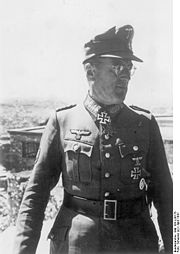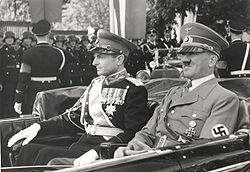Ein Anderer Hitler by Hermann Giesler: Fateful Decisions
FATEFUL DECISIONS:
The Balkan
Translation and commentary by Carolyn Yeager and Wilhelm Mann
Ein Anderer Hitler, Druffel Verlag, Leoni am Starnberger,6th edition, 1982.
Copyright 2010 Carolyn Yeager
The Balkan
Giesler: “–a few days later the putsch occurred in Belgrade. Here again, although hidden, the combined effort of the English and Russian leadership stage managed that revolt.”
Yugoslavia’s anti-Russian regent Prince Paul rides with Adolf Hitler in March 1941 when he agreed to join the Tripartite Pact (Berlin-Rome-Tokyo). The Balkan now seemed secure since Bulgaria also signed, and Hungary and Rumania were already partners. Hitler was aware of the danger of military operations by the West via a thrust from the Mediterranean towards Greece, Albania or Trieste.Two days after Yugoslavia’s formal signing of the Pact in Vienna on March 25, Paul’s regime was toppled in a military coup led by Serbian General Dusan Simovich, but initiated and planned by British officers, and certainly with the encouragement and knowledge (if not active help) of the Soviets.
Deploying the Waffen SS Leibstandarte Adolf Hitler Division from the Russian front and Gebirgsjaeger mountain divisions from Austria,Hitler attacked both Yugoslavia and Greece hard on April 6. Simovich and the newly installed pro-British King Peter fled the country, ending up in England in June. On April 10, the nation of Croatia seceded from Yugoslavia and allied itself with Germany. Yugoslavia capitulated on April 17. The British invasion troops fled to Crete, Cyprus and finally to Egypt.
On June 2, Greece collapsed after a tough battle in which Austrian mountain battalions played a decisive role. Three or four Gebirgsjaegerdivisons accomplished a remarkable feat, first by arriving there so quickly, and then by successfully climbing around behind the Thermopylae Pass in the rocky Greek hills, carrying their equipment (guns, ammunition, food) on mules and small horses, with some motorized vehicles. Along with a shortage of water in the great heat, they met heavy resistance from the Greek Army. General Ferdinand Schoerner, pictured below, a Bavarian from Munich and the last chief of the German Army in 1945, commanded the 4thGebirgsjaegerdivision and became the “Conquerer of the Acropolis.”
It was a complete victory for the Axis forces, but it delayed the invasion of the Soviet Union, which may have been a fatal stroke in that war.

General Ferdinand Schoerner, with the Acropolis in the background.



No comments:
Post a Comment